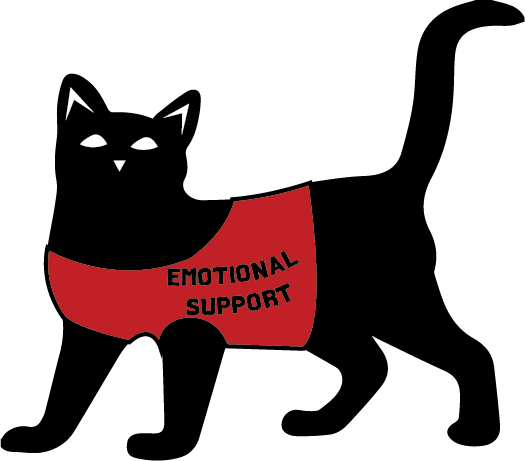App State Housing allows for select animals to live on campus. Emotional support animals provide comfort and reassurance to their owner, while service animals provide trained support and perform tasks. Both are allowed in the dorms, as long as their owners fill out the proper paperwork to register and certify them. ESAs have proven to be beneficial in recent studies, and have an increased presence in many colleges and universities. However, there are downsides to owning them and having them while in college, which can be some of the most tumultuous years people experience. It’s important that people truly understand the demands of having an animal, and the effects it has on others.
Living in the dorms during undergraduate studies is unpredictable. Many obstacles come with dorm life, such as unruliness from others, loud noises, sporadic fire alarms and occasional roommate rifts. There are also people living in the same residence hall with allergies to animals, which affects them if a person has not been up to date cleaning their dorm room. The animal odor and hair can travel, especially in the hall corridors. Having an animal live in these conditions is tiresome.
The dorm rooms at App State range from 14 feet 8 inches by 10 feet 6 inches to 23 feet 1 inch by 13 feet 8 inches, which pales in comparison to the free range of a home or apartment. Following the guidelines of App State Housing, animals are to be left caged inside the dorm room until their owners are done with their classes and their outside life. Animals are also high maintenance; they require food, daily cleanup, outside time, interactions, cleaning, regular checkups and emergency visits or treatments. For a college student, these responsibilities mounted upon school and social life can add more stress and problems.
In the same realm of ESAs, there is also a rising market geared towards creating false ESA documents for housing for cheap prices. It exists because there has been a rise among people collectively attempting to fraudulently forge these papers to have their pets with them. Not all students do this, but some may obtain pets to have people favor them and have some sense of popularity. They also value the cuteness of having animals but fail to be well-equipped or educated enough to truly care for a living creature, and when the going gets tough, many are dumped at local animal shelters due to the inability to care for them.
Disguising pets as ESAs and forging the documents is a Class 3 misdemeanor. Everyone may know a friend or a friend of a friend who has had bad experiences with false ESAs or who have personally lied on the documentation. It is no secret.
Having an ESA is no joke. Feeling prepared vs. actually being prepared is a major difference, and once an animal is in your life, that commitment is years long. There are some people who attempt to bypass these rules and do so because of the leniency in verifying their papers.
Abusing the system for personal gain while jeopardizing others is a serious offense that should not be easy to do in the first place. App State should take into consideration implementing a stronger process of obtaining these documents and allowing animals on campus. There should also be a process to help deem whether one is fit to emotionally and physically care for an animal in the dorms.


